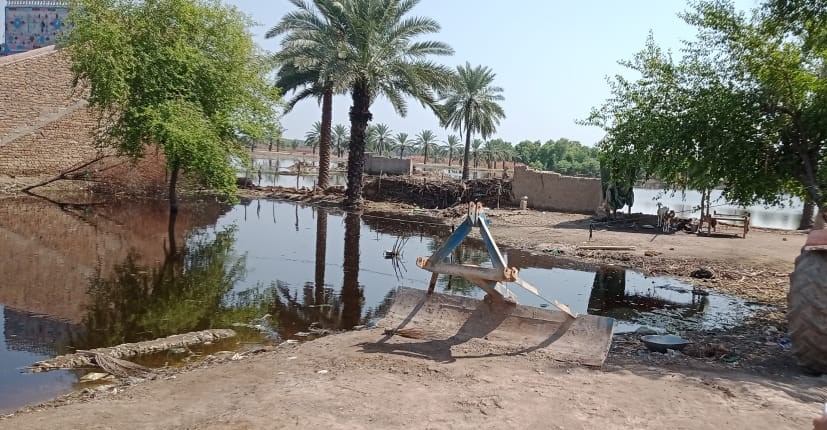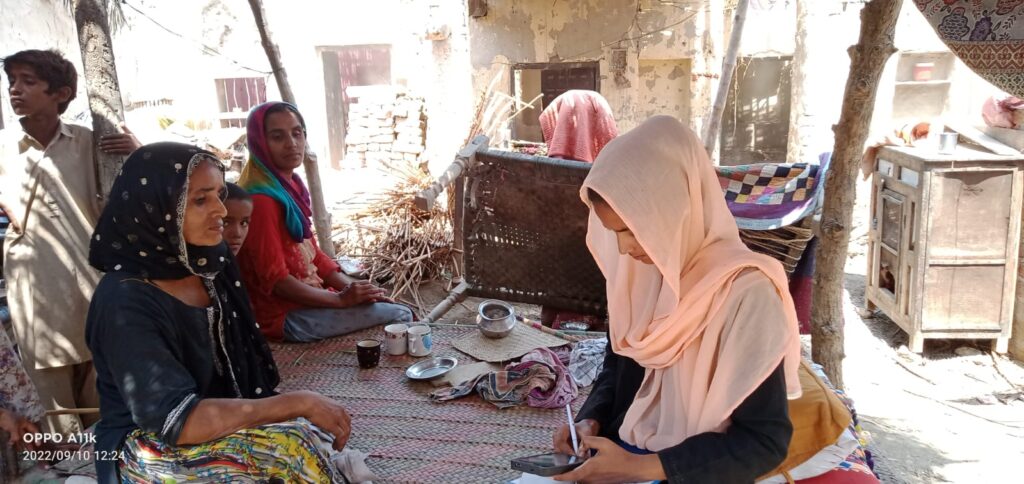
An article on climate change written by Hafsa Abdul Shakoor
Empowering Communities & Combating Climate Crisis:
Sungi Development Foundation Efforts in Pakistan.
- Context
Climate change is a long-standing issue that has been addressed globally. However, it cannot be solved via mere discussion alone; actionable efforts must be taken to halt this catastrophic climate change. Given that Pakistan’s carbon footprint is less than 1%[1], it is one of the ten countries affected by extremely hot, cold, and humid weather. Pakistan experiences flooding issues every year. A massive, disastrous flood struck Pakistan in June 2022, killing thousands of people, and costing the country billions of dollars. Climate change has been accelerated by human activity. The desire of states to increase their authority and their self-interest has been important contributors to the destruction known as climate change. The main causes of climate change include the combustion of fossil fuels like coal, oil, and gas; agricultural practices; and deforestation, which has also contributed to the phenomenon. Only deforestation and agricultural operations, according to the IPCC (Inter-Governmental Panel on Climate Change), emit 23% of greenhouse gases. Many first-world nations that are part of climate change conventions still rely on coal and fossil fuels, which contribute to the emission of greenhouse gases, even though they are under the Paris Accords commitment. According to Joseph S. Nye Jr., the USA and China alone release 40% of greenhouse gases, which has an impact on developing nations like Pakistan because their carbon emissions are far lower than those of the industrialized world.

Pakistan is a country in South Asia and has the fifth-largest population in the world. The country’s population will reach 241.49 billion people in 2023. Intense monsoons and high temperatures are the two main meteorological conditions that Pakistan experiences. Air and water temperatures are rising due to global warming, which increases evaporation. The more moisture the air can contain, the more intense the monsoon will be. Global warming is causing glacial ice in the country’s northern region to melt, which causes flooding. According to FFC (Federal Flood Commission), Pakistan has had 28 significant floods in the past 76 years.
Pakistan is the best illustration of the environmental destruction caused by man-made climate change. Pakistan experienced a disastrous flood in June 2022 that devastated all four provinces, but most severely Sindh. On September 5, 2022, the Monsoon Situation Report from the National Disaster Management Authority (NDMA) stated that 1,545 people had perished and 12,850 had been injured across the nation. A total of 1,921,622 homes were damaged (765,162 completely and 1,135,829 partially). According to the Post-Disaster Need Assessment, this flood cost Pakistan 14.9 billion in damages and 15.2 billion in lost economic output. Humanitarian-based Sungi Development Foundation (SDF)[2] began its relief emergency response in Sindh’s flood-affected communities as they were the country’s forefront organization for humanitarian response.
- Sungi Addressing Environmental and Climate Challenges
Sungi has worked on numerous environmental concerns, particularly deforestation, since its founding in 1989. In 1992, Pakistan experienced a severe flood; Sungi organized emergency relief efforts in the affected districts. Following the devastating earthquake in 2006 that destroyed much of the infrastructure and claimed many lives, Sungi’s Disaster Risk Reduction (DRR) unit was added. To address the vulnerabilities, Sungi also launched Community-Based Disaster Risk Reduction (CBDRR) and Community-Based Disaster Risk Management (CBDRM). To lessen the country’s vulnerability, it concentrated on civic education such as school curriculum, mapping, vulnerability assessments, and dangers around the nation. Sungi is collaborating with numerous communities to embrace environmentally friendly practices to reduce vulnerability, enhance capabilities, and raise awareness of the risk that traditional ways pose to the climate to lessen the effects of climate change. Major portions of KPK, Azad Jammu Kashmir, Punjab, and Baluchistan are covered by Sungi.
- Mitigating & Responding to Climate Change Impacts

Pakistan’s rain-affected area exceeded the average amount of 67% in June 2022 alone. Around the six provinces, 90 districts were hit by this intense monsoon, which also caused significant flooding and landslides that seriously and unexpectedly affected infrastructure and human lives. According to Pakistan Sector Working Groups, 2.2 million students were affected by this disaster, which also caused damage to 34,204 schools across 126 districts. The organization has supported the community in a variety of ways. To alert the residents to anticipated landslides and rainfall so they may make immediate safety preparations, the SDF launched the Early Warning System in 2020. The Sungi Development Foundation’s early and thorough response to humanitarian and environmental issues during the floods of 2022 served as an example of the power of grassroots organizations in enacting positive change. They also established Temporary Learning Centers (TLS) in Sindh and other provinces to address education impacts from flooding. Sungi demonstrated its commitment to improving the lives of marginalized groups, such as women, minorities, and individuals with special needs, by giving social mobilization, community involvement, and rights-based advocacy priority.
- Strategies For Combating Climate Change
There is no doubt that the planet Earth is under threat from climate change. Reducing greenhouse gas emissions to zero is the fundamental solution to this issue. The more fossil fuels are burned, the worse the problem will get; hence, they should be left in the ground. For the sake of the planet’s health, renewable energy sources like solar, wind, and electric vehicles should be used instead of coal and gas. Reduced reliance on personal vehicles and increased public transportation will reduce greenhouse gas emissions and ease traffic congestion. States must establish a mechanism to carry out climate change policies to increase reforestation and safeguard the ocean from overfishing, deep-sea mining, and oil and gas drilling. Because trees and the ocean absorb a significant amount of carbon dioxide from the atmosphere, they can be crucial in preventing climate change. To protect nature from climate change, eliminate all plastic use. It is important to start awareness campaigns to inform and persuade individuals to lessen their carbon footprint. In a nutshell, society must make efforts at all levels to combat climate change, including individual decisions and governmental actions. It is vital to adopt sustainable habits, switch to renewable energy, safeguard ecosystems, encourage reforestation, ocean protection, and reduce plastic waste. A worldwide movement can be sparked by awareness and education. Cooperation is imperative to address the issue of climate change.
[1]The World Bank
CO2 emissions (metric tons per capita) – Pakistan | Data (worldbank.org)
[2] Founded in 1989, Sungi Development Foundation (SDF) is a non-profit organization registered under the Society Act of 1860. A board of governors, made up of professionals and activists of diverse educational backgrounds, oversees this organization. The organization has finished numerous projects in the humanitarian and development areas since 1989. The NGO works closely with its partners and stakeholders to have a significant presence across the country in both urban and rural areas. It has implemented nationwide sustainable programs and projects.

